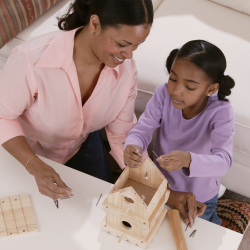“Why do you keep asking me this same question, mummy?” my six-year-old daughter, Elle, asked. She was tired of answering all my questions about the Christmas party her school was planning. But I just needed the low-down on the presentations she would take part in, so I could create an adequate mental image of how things would go.
What if she forgot her verse while singing in the choir? But no one expects perfection from a little child, right? Still, what if people laughed at her? That would crush me to pieces. But this wasn’t supposed to be about me. I would feel hurt, not her. She’s a confident, expressive, and resilient child who always bounces back so quickly that I’ll forever be envious.
So, I was the problem.
“I think you should just try to take your mind off the event for now. It’s still more than a month away.” My partner gave me a reassuring smile as we prepared to see a movie after sending the young woman to bed.
That smile. It was meant to be sweet and reassuring, but all it made me feel at that moment was sheer inadequacy. I had no self-control. Why was I the only one bothered by Elle’s upcoming performances at the event? Why was I the only one breeding anxiety for an event that was still weeks away? Why was I the only one dreading being seated amongst other parents for more than two hours? Or was I not the only one?
My partner and I always talk about anxiety, ADHD, and other mental health problems, and there have been a few times when he has expressed his feelings and spoken of his struggles with social anxiety and depression. But I’m always the one babbling about my many mental struggles 90% of the time. Am I just a weakling? Or is it just some kind of toxic masculinity? My assumptions hold water, but I’ve realised that the real culprit is a parenting trigger, and I’m not the only one affected by parenting triggers. He’s had many moments when he would lash out, and it would be my turn to be the calm one, giving the same reassuring smile and cute speeches. So I was sure the main cause of my excessive worrying about the event was a trigger. And what was triggered? My atelophobia.
Atelophobia is the fear of imperfection, a fear I developed as a very young child in response to negative criticism and all the terrible words of disappointment I received from my pseudo-perfectionist mother and other adults around me.
My mother was a school teacher, so my grades needed to be impeccable. She was a devout Christian, so my performance in church activities needed to be righteously perfect. The constant looks of disapproval and words expressing disappointment were more than enough to destroy my self-esteem and make me feel unworthy of winning anything, even when I was winning. I started excusing myself from performances or competitions with made-up bellyaches or dizziness. I was still forced to partake in so many activities, but I got through them with my heart in my mouth. I believed I didn’t have what it took to be perfect, and to me, imperfections meant failure, so I was always ready to fail before the activity started.
And of course, my grades suffered as I grew older. The only subjects I ever passed were the ones I had a great interest in, like Literature and English. I was an avid reader; storybooks and novels were a great escape from my woes. The other subjects were for the perfectly intelligent kids, and performing dances or plays on stage was for the perfectly confident kids.
Once in a while, I would join these performances and regret it. One imperfection and my whole life would be miserable. I would spend hours reliving every moment of imperfection and pondering all the things I could have done differently. The need for perfection always made me mess things up, so I preferred being a background performer. By the time I got to the university at 15, I was done with joining anything at all. I skipped social events, missed tests, never bothered about assignments, and struggled through examinations. There were many other reasons for these shortcomings, but atelophobia played a huge part.
Now I’m 30 and still battling atelophobia and all the things my child does that trigger it. I dread her recitals, school plays, test days, and grade reports. It’s not because I want her to be more perfect than she already is–the best thing in the world–but my fear that someone will laugh, scoff, and not only criticise my inability to be a perfect child but also my failure to have a flawless child. I also don’t want her to feel the same way I felt when I made mistakes as a child. But she’s a different child than I was, and I need to realise that soon enough before she catches on to my unhealthy fear of imperfections and stops bouncing back from challenging situations so easily.
I didn’t take my partner’s advice about the school event; I kept asking Elle questions about the event until I was seated amid the other parents watching our children “shine” on stage. Elle was part of the choir and they sang beautiful Christmas songs. She didn’t remember to get the mic from the last person who sang when it was time for her to sing her verse. She had to stop, collect the mic and start over. I held my breath the whole time, but it was fine. No one was laughing or anything.
She came out again, this time for a class presentation about the joys of Christmas, and she stepped out to introduce the presentation. WHAT THE HELL? She never said anything about introducing anything. She didn’t rehearse it at home with me like she did the other stuff. I tried to breathe through it until the last word. She pronounced it like her teacher, who had a strong Yoruba accent!
I have no issues with having a strong accent; I have a strong Nigerian accent. But I knew Elle never pronounced the word that way. No one at home ever did. So that could have been avoided! I felt anger at that moment, but it wasn’t my daughter’s fault that she had innocently absorbed the accent of the teacher who helped her rehearse the introductory speech. Having a strong accent wasn’t the teacher’s fault either. But I couldn’t stop the feeling of failure from taking over me and the tears from welling up in my eyes. People chuckled and laughed as she smiled tentatively, stepped back in line, and passed the mic to the next child. And that did it for me.
My atelophobia was valid. All my fears were valid. I couldn’t hold it in; I took the car keys and went to find the car. Yes, I promised not to jostle for perfection, but did it have to go so bad? I cried bitterly. Mourning my lack of emotional or mental resilience and wishing I never let all the criticism and disappointed comments I got as a child turn me into a grumpy pessimist. I thought about getting a cab to take me home, but what sort of mum would that make me? My child needed me to be there, and I was going to do just that.
When I got back, it was already time for her last presentation, and I saw the joy on her face when she saw me in the crowd. It was worth it. On the way home, we told her how wonderful she had done and how proud we were. But I couldn’t hold back the need to ask her why she said that particular word that way. She shrugged but started to give it a thought, and her smile faded. I felt instant shame. What was I doing? I hugged her and reassured her that she had done nothing wrong at all and that the accent thing was barely even a setback. Even if it was, setbacks happen, but what matters most is how we let them affect us.
I hope the next time I write about atelophobia will be to tell you how I’m overcoming it and teaching my inner child and Elle that imperfections are not inadequacies and that accepting each of them helps you become the best version of yourself.




